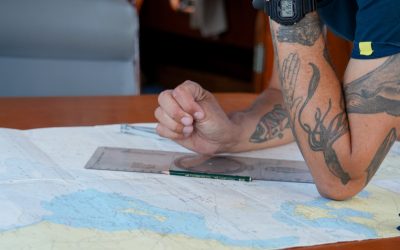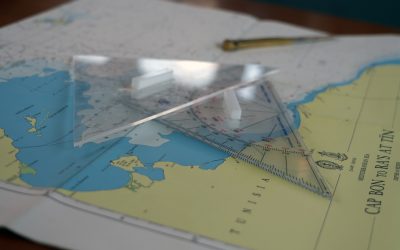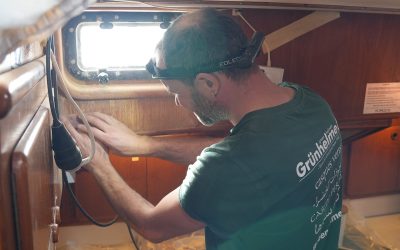Deploymentreport 1 – 2025 (8.3.–29.3.2025)
Mokwele, 30 years old, from Cameroon,
and
Nazem, 23 years old, from Sudan.
Our mission is overshadowed by the death of two people. They drowned during our second rescue mission on the night of March 15/16, 2025 in the Libyan search and rescue (SAR) zone.
That night, at around midnight, we came across an overcrowded green inflatable boat near a Libyan oil platform that was already completely full of water. We had learned about the boat through a mayday relay – the forwarding of a call for help – from a Frontex aircraft. Due to strong winds and high waves, we decided to hand over life jackets from the NADIR and bring the people alongside directly on board. The people on the dinghy were very frightened and pushed their way to the life jackets. Due to the strong waves and the completely overcrowded boat, people sitting on the outer tubes fell into the water. Some people floating in the water were quickly swept away from the NADIR by the strong wind, so we had to hurry to find them in the dark, stormy night. And although we immediately threw our centifloats, long inflated air hoses and lifebuoys overboard and launched the dinghy, we were unable to rescue everyone. We mourn the loss of Nazem and Mokwele, whom our help could not reach.
We were able to evacuate seven people directly onto the NADIR or with the help of our tender – including Noori, a five-year-old boy, five women and some unaccompanied minors. Once the 67 people were on board the NADIR, we set off on our 20-hour journey back to Lampedusa – against the waves and wind. About every second wave flooded the foredeck of the NADIR – the area where the majority of our guests are usually accommodated. As many people as possible therefore found shelter in the aft and lower deck of the NADIR during the crossing – 23 people in total, including the women and the child. Only eight people had to remain in the forward, but more sheltered area between the mast and the deckhouse due to a lack of space.
It wasn’t until half a day later that the wind slowly died down, and hours later the waves did too, so that some relaxation spread on the NADIR – both among our guests and the crew. When it was warm enough and the sea was calmer again, the guests were able to come on deck from the galley and we were able to cook for them. After the meal together, we shared important information with them regarding their arrival in Lampedusa and Europe, as well as useful contacts for their further journey. Around 9 pm on March 16, we reached Lampedusa, where our guests went ashore and the Italian authorities and the Red Cross were already waiting for them.
This mission shows that the situation for those seeking protection is becoming increasingly precarious. NADIR’s first mission this year once again illustrates how precarious the situation is for refugees in the Mediterranean. The boat had apparently left Libya despite the expected adverse weather conditions and entered a bad weather area just a few hours later. The completely overcrowded rubber dinghy was not suitable for these conditions. But the people fleeing inhumane conditions in Libya are not deterred in their desperation from taking the high risk of crossing. Many cannot afford the cost of better boats. In our estimation, none of the people on the run would have survived that night if we had not found them.
Solidarity in the Central Mediterranean
In three other missions, together with the Italian Coast Guard, the AURORA from SEA-WATCH and the HUMANITY 1 from SOS HUMANITY, we supported people on the run and helped to bring them to safety.
In the early morning of March 13, 2025, we found 43 people on an overcrowded black inflatable boat inside the Libyan SAR zone. According to the people on the boat, they had been traveling for two days. Everyone was calm and followed our instructions. Apart from seasickness and exhaustion, there were initially no medical symptoms. After we had distributed life jackets and drinking water, we headed north together. After about 2 hours, the people on board the inflatable boat informed us that one person had lost consciousness. Our second on-board doctor quickly assessed the situation from our tender and we decided to take the person on board the NADIR for medical care. We informed the relevant rescue coordination centers and asked for assistance. Around 30 minutes later, a rescue boat from the Italian coastguard approached and took all the people on the inflatable boat as well as the exhausted person on board the NADIR, who had been able to recover somewhat thanks to the treatment provided by our on-board doctor.
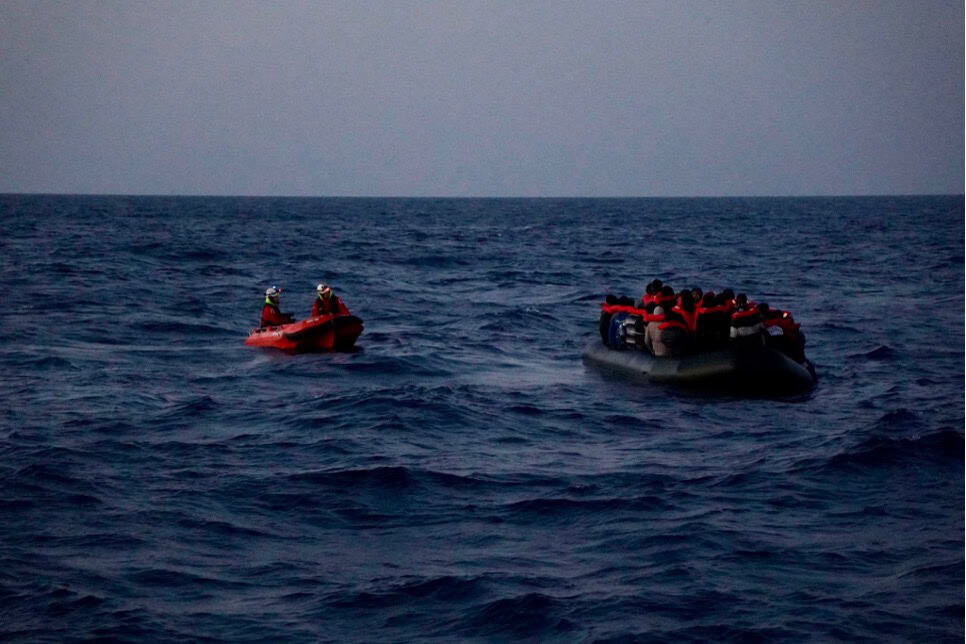
During our third relief mission on March 18, 2025, we rushed to help one of the PILOTES VOLONTAIRES to help after a distress at sea was discovered on the route from Tripoli to Sicily. Due to the great distance and the unknown course of the wooden boat, we were afraid of missing it – which is why we asked the crew of the AURORA for assistance. The AURORA reached the boat we were looking for about an hour earlier and stabilized the situation of the people on the boat. It soon became apparent that the boat had run out of fuel and was simply drifting. While the AURORA waited for a decision from Malta and Rome on how to proceed, the weather worsened and darkness fell at night. Taking the people on board an NGO ship thus threatened to become increasingly dangerous. Finally, the AURORA decided to transfer the people on board with their tender. After an initial trip, they asked us for assistance as their tender had developed engine problems and could no longer cope with the increasingly high waves. So we brought the remaining 18 people to the AURORA with our tender. Initially, the AURORA team was assigned a safe harbor in Sicily. However, due to the rapidly deteriorating weather conditions, the crew asked for Lampedusa as a safe harbor. Port of Safetywhere the people were finally allowed to go ashore.
Our fourth mission took place on the night of March 24-25 within the Libyan SAR zone: both ALARMPHONE – an independent hotline for people in distress at sea – as well as the aircraft SEABIRD from SEA-WATCH reported that a wooden or fiberglass boat was located there. At the same time SEABIRD another boat with around 75 people was discovered further north within the Maltese SAR zone. Making a decision here was not easy, also in view of the rapidly deteriorating weather. Once again, strong winds, high waves and storms were forecast. However, when it became clear that the AURORA would take over the case in the north, we agreed with the HUMANITY 1 to keep on course for the two boats in the southwest and reached the position after dark – at the start of a storm. While we were stabilizing the situation of the 60 or so people on the one boat with the tender of the NADIR, the HUMANITY 1 also arrived. Based on the experience of our second rescue mission, we asked the HUMANITY 1 whether it could offer the guests a more sheltered stay, to which the crew replied in the affirmative. The HUMANITY 1 then took the passengers from both boats on board, while we secured the situation with both the NADIR and our tender.
On the way to Sicily, the crew of the HUMANITY 1 found out in conversation with their guests that the boat was both the ALARMPHONE and the boat discovered by SEABIRD – i.e. one and the same boat. So we were relatively certain that we could help all the boats that night – with the exception of one that was also discovered by ALARMPHONE reported boat that did not make it against the waves and was driven back to the Libyan coast, making it unreachable for us.
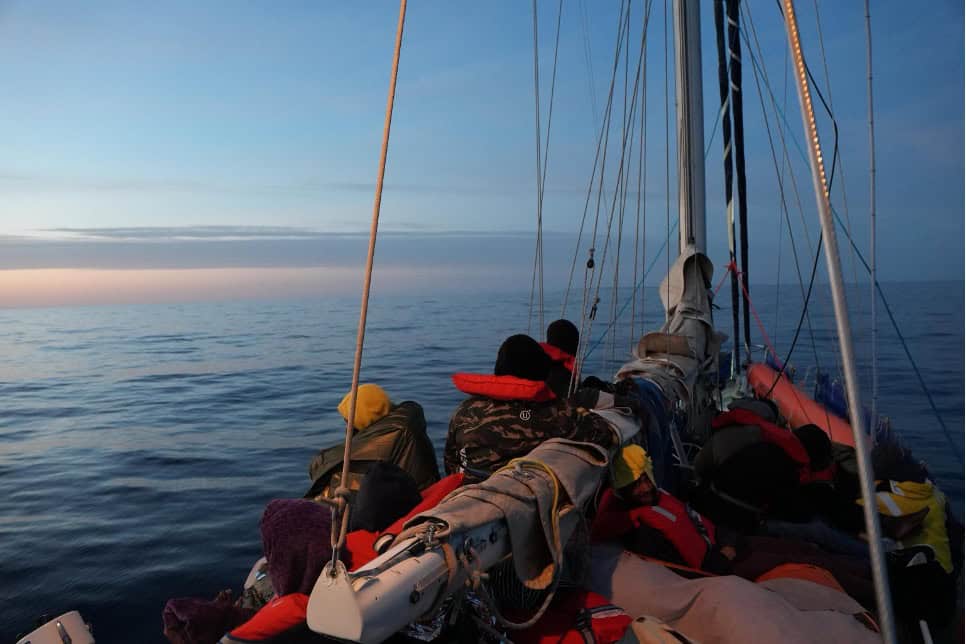
The solidarity of the civilian actors in the Central Mediterranean was clearly felt during our missions. ALARMPHONE, PILOTES VOLONTAIRES, AURORA, SEABIRD (both SEA-WATCH), HUMANITY 1 (SOS HUMANITY) – but also the Italian Coast Guard – showed their solidarity. And last but not least, we were the ones who became aware of a boat near the oil platform in the Maltese SAR zone through a mayday relay call from a Frontex aircraft. This shows: If everyone fulfills their humanitarian responsibility, good support for people on the run is possible – even in difficult weather conditions. To ensure that people are no longer forced to take the extremely dangerous route across the central Mediterranean, we are calling for the establishment of humanitarian corridors and a thorough examination of the causes of flight for those on this route – with the aim of eliminating these causes in the long term.
Lampedusa – the gateway to Europe
We also felt solidarity on Lampedusa. After our second rescue, we received donations of clothes from MEDITERRANEAN HOPE to replenish our supplies on board. We met up with people from other NGOs – MALDUSA, MEDITERRANEAN HOPE, SEA-WATCH, PILOTES VOLONTAIRES, DAKINI. Also as part of the festival BOZA! Il Mediterraneo risuona. Musica e comunità contro il razzismo (19.-22.03.2025) we exchanged ideas with fellow campaigners from other organizations. Together, we commemorated the dead and missing from a boat that was discovered northwest of Lampedusa on March 18. When the Italian coastguard arrived there, they found only ten people still alive. Six bodies were recovered and a further 40 people are believed to be missing.
Strong winds and high waves accompanied us throughout the entire first mission and presented a challenge for the crew. Due to the seasonal bad weather, there were few boats at sea overall and we also spent a further six days “weathering” on Lampedusa in addition to our ten days at sea. During our time on site, we visited the Porta d’Europa (Gate of Europe) memorial and organized a joint farewell ritual for Mokwele and Nazem at the island’s cemetery. Both of them are in our thoughts and our thoughts are with their loved ones.
We are saddened by the death of the two young men and angry at the racist policies of the EU. We are determined to continue to actively fight for the right to freedom of movement for ALL people and especially for those seeking protection!
Image rights: Yannick Rübel | RESQSHIP e.V.

